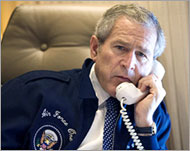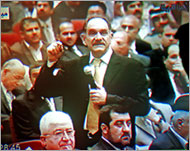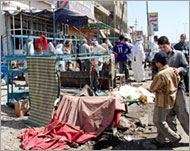New Iraq government takes charge
Iraq’s first full term government faced its first day in office on Sunday with a vow to combat fighters, restore stability and set the stage for the eventual withdrawal of US and other foreign troops.

Since the cabinet was sworn in on Saturday, at least 33 people have been killed in a series of attacks across Iraq, and police found the bodies of 22 Iraqis who apparently had been kidnapped and tortured by death squads that plague the capital and other areas.
Earlier in the day, Nouri al-Maliki, the new prime minister, and his 40-member cabinet took the oath of office inside the heavily fortified Green Zone in central Baghdad, where American and Iraqi soldiers provide security from the turmoil sweeping the country.
After a two-hour delay, reportedly because of last-minute wrangling over some cabinet posts, legislators dressed in suits or traditional Arab robes slowly filed into the parliament chamber. Outgoing members of the interim legislature greeted each other with kisses to the cheeks.
The vote of approval went quickly, with parliament members elected in December 15 elections waving raised hands to ratify al-Maliki’s nominees one by one.
US, UK approval
The new permanent government resulting from last December’s elections in which 12 million Iraqis participated has been portrayed by Western officials as the best hope for changing the dynamics of violence in Iraq.
But it must expand control and persuade fighters, assassins and militias to stand down, with no guarantee of success.
 |
|
Bush welcomed the new cabinet |
George Bush, the US president, who is facing rising criticism at home over Iraq, welcomed the new cabinet and promised continued help from the United States.
“The United States and freedom-loving nations around the world will stand with Iraq as it takes its place among the world’s democracies and as an ally in the war on terror,” Bush said in a statement.
Zalmay Khalilzad, the US ambassador in Iraq, repeated US cautions against expectations of a quick pullout of the 132,000-strong American military contingent. But, he added, that “strategically, we’re going to be moving in the direction of downsizing our forces”.
Tony Blair, the British prime minister, said: “Despite all the attempts to disrupt the political process they have a government, a government … of national unity for the first time.”
Blair said coalition soldiers hoped to transfer their duties to Iraqis as soon as possible, but that British troops would remain in Iraq for as long as they were needed.
“The timetable is governed by the job being done. The new prime minister today made it very clear he, like us, wants to see Iraq in control of its own destiny,” Blair said.
Top priority
Al-Maliki, a Shiite Muslim who spent years in exile in Syria during Saddam Hussein’s rule, promised that restoring security would be his top priority.
“The first challenge we face is security and how to deal with the terrorist killers who are destroying the country and shedding the blood of the Iraqi people,” he said.
|
“The first challenge we face is security and how to deal with the terrorist killers who are destroying the country and shedding the blood of the Iraqi people” |
He outlined a 34-point plan to bring security, implement the rule of law and restore basic services like electricity – now available for only four hours a day in the capital.
In a sign of the divisions that held up forming the government, al-Maliki could not work out an agreement on the cabinet’s three posts responsible for security and had to appoint himself and two deputy prime ministers to temporarily hold those positions.
Al-Maliki, who has a reputation as a hardliner, was chosen by the dominant Shia bloc after Sunni and Kurdish parties refused to accept Ibrahim al-Jaafari, the incumbent prime minister, for a second term.
US officials,too, opposed al-Jaafari, viewing him as ineffectual. Nevertheless, al-Maliki, 55, is politically close to al-Jaafari and largely untested as an administrator.
Hussain al-Shahristani, the Shia Muslim chosen as oil minister, promised to increase oil production and give all Iraqis a share.
“For every Iraqi, a share in the oil wealth,” al-Shahristani said.
Vacant ministries
As for the three unfilled posts, al-Maliki said he would be acting as interior minister for now, and he tapped Salam Zikam al-Zubaie, his Sunni Arab deputy prime minister, as temporary defence minister.
Barham Saleh, the deputy prime minister, and a Kurd, will be acting minister of state for national security.
 |
|
Winning over Sunnis will be a big |
The new prime minister hopes to fill the jobs with politicians who are independent and have no affiliation with any of Iraq‘s sectarian militias, which are blamed for the sharp rise in Shiite-Sunni bloodshed that has raised fears of civil war.
The greatest drama of the day underlined the difficulties al-Maliki faces in calming those sectarian passions.
Sunni Arab lawmaker Saleh al-Mutlaq demanded that the government’s swearing-in be postponed until the security ministries were allotted, delivering an angry speech that lasted nearly 10 minutes before the microphone was taken away.
Then he and about 10 other Sunni deputies from his Arab nationalist faction walked out in protest.
Irregular civil war
 |
|
Violence in Iraq has become a |
Many analysts fear the country’s violence has assumed some characteristics of an irregular civil war, including targeted assassinations, sectarian bombings and armed groups seeking power and attacking the central government and its employees.
Many of Iraq‘s anti-government groups are led by Sunni Arabs, and a goal of the new government is to win the support of that formerly dominant minority and to recruit as many of them as possible into Iraq‘s security forces – especially in anti-government strongholds like western Anbar province.
One of Saturday’s attacks, a suicide car bombing at a police station that killed at least five people and wounded 10, took place in Anbar city of Qaim.
In the day’s deadliest assault, 19 people died when a bomb hidden in a paper bag exploded in Baghdad‘s Sadr City district next to a line of day labourers waiting for work.